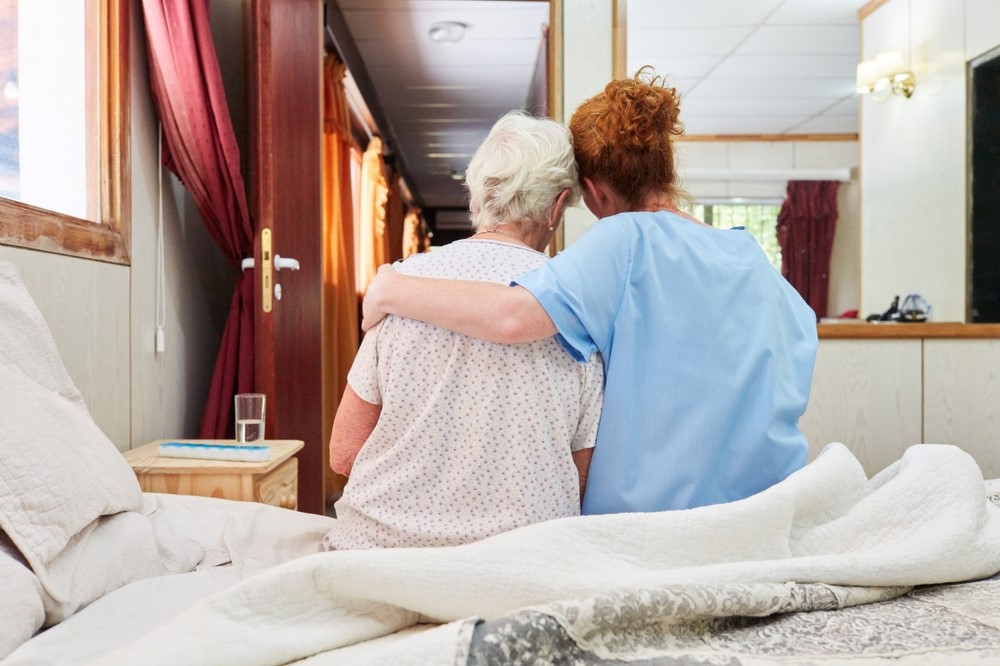
Hospice is an incredibly important service. Whether provided in the home or in a facility, it is a step back from trying to cure disease and a focus instead on quality of life.
It’s easy to imagine that hospice care means that you’re giving up on a loved one.
Nothing could be further from the truth.
Instead, one of the benefits of hospice care is that it gives the patient a better end to their life, where they get the chance to focus on what matters to them.
What Is Hospice?
Hospice provides palliative care for patients who are no longer seeking to cure their disease – often when there are no more treatments to pursue. It’s common for end-stage cancer patients, but also applies to people with dementia, heart disease, and a variety of other serious illnesses.
Eligibility for hospice is specifically related to having a terminal diagnosis and six months or less to live.
Hospice care is most often provided at home, where hospice staff work with family caregivers to support the patient. The services may be provided in a specialized facility or a nursing home instead, particularly if the patient has complex medical needs or does not have a family member to provide extra support.
That said, the vast majority of hospice care occurs in the home.
Hospice vs. Palliative Care
The terms hospice and palliative care are often used interchangeably. This isn’t surprising, as there are plenty of similarities.
At its heart, palliative care aims to alleviate the symptoms that come with serious illnesses. This includes reducing pain and nausea. Palliative care is relevant for any serious illness, regardless of prognosis.
In contrast, hospice is only for patients who are expected to live for six months or less.
It does provide palliative care, but nothing else.
So, if you’re getting palliative care outside of hospice, you’ll have access to treatments to help cure or slow down your condition. If you’re going through hospice, then you don’t get such treatments (and shouldn’t need them either).
The Benefits of Hospice Care
End of Life Becomes Less Painful
Hospice care focuses on helping patients to feel as good as possible, helping to decrease pain and discomfort.
This can be powerful, as patients who are dying often have conditions that cause considerable distress.
Indeed, hospice often uses more powerful painkillers than many other environments – and certainly better ones that can normally be accessed at home.
This ability to make people comfortable is why so many family members sing the praises of hospice. The difference can be huge – and not just for the patient.
Other Support Services are Provided Too
Hospice care goes beyond symptom management. There are often services to help spiritually, emotionally, with grief, and even with financial advice.
A particularly important aspect is helping to prepare the patient and their family for what comes next. Losing a loved one is never an easy process – and hospice staff have sat with many families in the same situation, giving them plenty of empathy and experience.
Some of this support extends to the patient’s family as well, helping to make the experience less intimidating for all who are involved. Hospice care even provides respite support for the primary caregiver, giving them a break and an important chance to process all that’s happening.
It Improves the Quality of Life
Hospice is often thought of as giving up, where a patient is resigning themselves to die. But, this isn’t the case.
Instead, hospice focuses on quality of life.
It means that rather than dealing with an array of treatments and procedures, patients can focus on the things that matter to them. This often involves spending more time with loved ones and working to improve relationships.
Hospice also provides services that help in these areas, including social workers and spiritual counselors.
Gives the Patient Control

Hospice care focuses on making the patient comfortable. This includes allowing them to choose the direction of their care.
For some patients, this could mean being in no pain, while others might choose to lower the dose of their pain medication so that they feel more coherent.
Can Extend Life
Because hospice helps to manage symptoms and support emotional well-being, it can extend life. The life extension may be short, just 20 days or so, but this is valuable time to spend with loved ones.
Provides the Chance to Die at Home
Many seniors hate the idea of dying in a hospital or some other facility. They’d much rather die in a familiar environment, with loved ones nearby.
In fact, most of us probably feel that way.
Hospice care is often provided at home, so seniors do get this chance. For many, the experience is overwhelmingly positive, providing care, connection, and safety.
Family Members are Often Less Stressed
The benefits of hospice care don’t just relate to the patient. They’re relevant to families and caregivers too.
After all, watching a loved one in pain is incredibly stressful. It can also be terrifying.
By making the patient comfortable, family members also start to feel better. There’s also less for them to worry about.
Hospice can be incredibly helpful for caregivers too.
You’re still responsible for most of your loved one’s day-to-day needs, but now you have a whole team of people supporting them and you. The respite care is powerful as well.
Can Help With Finances
Hospice care is covered through Medicare, Medicaid, and often private insurance. As such, most of the costs are paid, including things you mightn’t have been able to afford before, like regular home visits.
This often means that you’re actually saving money while a loved one is going through hospice.
Are There Any Problems with Hospice?
While hospice can be amazing, there are some problems to be aware of too.
Treatments are Generally Stopped
The first potential issue is that hospice care focuses only on symptom relief.
Because it’s targeted at patients who are going to die soon, treatments to cure the illness are stopped.
For patients who have exhausted all treatment options, this isn’t a problem at all.
However, sometimes people end up in hospice care when there are still avenues to pursue. In such situations, hospice care could actually lead to an earlier death.
This is why it’s so important to get a second opinion before a patient is signed up for hospice.
Thankfully, patients have the right to stop hospice if they choose to and return to being treated for their condition.
The Quality Varies
Medicare requires an array of specific hospice services. However, there’s still plenty of variation in quality between providers. Some places also provide more extra services than others.
Not surprisingly, for-profit companies are often a little worse in terms of care and services provided. However, there are many exceptions to that general rule.
As such, you’ll need to do your own research. Look at the services companies in your local area and see what people have to say about them.
Home Hospice Can Be Overwhelming

We also need to talk about hospice at home.
This idea is growing in popularity – and is truly powerful. It gives seniors the benefits of hospice, along with the chance to die in their own homes.
At home hospice generally involves support from a team of hospice staff members, including nurses, the patient’s physician, aides, and counselors. Family members play a vital role too.
There are many positive stories about at home hospice.
However, for seniors with severe or complex conditions, at home hospice can quickly get overwhelming. Family members may be responsible for many more tasks than they expected, such as recording symptoms and many types of physical care.
This could include bathing the senior, changing bandages, dealing with incontinence, and much much more.
The tasks may be particularly difficult if you weren’t a caregiver previously. It can also be hard to remember all that you’re meant to do, especially when things get overwhelming.
Some caregivers end up highly stressed about whether they’re doing things right. It may even seem, for a while, that you could have done better and helped your loved one to live longer.
This pressure also makes it difficult to fully connect with your loved one. There’s so much else going on that you mightn’t have the energy or capacity to spend their last days with them, which can be crushing.
You Need to Get an Appropriate Diagnosis
To be eligible for hospice, seniors must have a serious condition that leaves them with six months or less to live.
Seniors without such a diagnosis need to wait, even if they’re in incredible pain. This is frustrating for seniors and family members, but this is simply how things are set up.
This issue can be particularly challenging for dementia patients, as the condition is often slow and unpredictable. It can be tough to get the diagnosis that you need to get your loved one into hospice care.
Final Thoughts
There are many benefits of hospice care for seniors at the end of their lives.
But, it isn’t all amazing.
Most hospice care happens at home, which can be stressful and overwhelming for family members. There’s also the chance that problems fall though the cracks, where you loved one doesn’t get all the support they need.
To avoid problems, it helps to research carefully and always seek a second opinion. Make sure you fully understand what is going on, plus what your options are.
Knowing the options is particularly important, as you may just have one recommended to you, when there are other ones as well.
Need Support?
As a Death Doula, Angelica guides and supports families through the end-of-life experience, giving you an anchor and safe space every step of the way.

It’s nice that you pointed out how in home hospice care focuses on assisting patients to feel as good as possible, helping to reduce pain and discomfort. Our grandfather is quite weak now and he just wants to live quietly in his home. We can’t possibly leave him all alone in his house so we should definitely hire some professionals to take care of him.